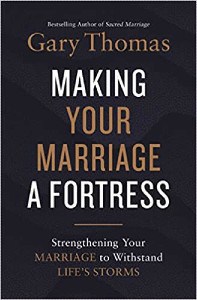Preview:
Gary Thomas: Three years after they were married, they got the diagnosis of MS on the part of Darryl. So, really, what motivated Stacey to get married, “I want a strong man who’s going to make me feel secure and who’ll take care of me,” would never come true. She had to completely die to those expectations and Darryl thought his relationship with Stacey would be, “You can count on me. I’m going to be there for you. I’m going to take care of you,” and now he says, decades later, she takes care of me.
End of Preview
John Fuller: That’s Gary Thomas describing some of the common storms that husbands and wives may face in marriage. Um, but there’s good news. God is always present with you in those storms and with his help, you can end up with a stronger, more intimate relationship afterwards. Gary is back with us today on Focus on the Family and your host is Focus President and author Jim Daly. I’m John Fuller.
Jim Daly: John, we had a great conversation with Gary last time and what’s frustrating with Gary, he’s always something that I, I got to do differently (laughs).
John: (laughs). That’s frustrating.
Jim: And he’s full of wisdom. I mean-
John: Uh, yeah.
Jim: He gives me those ideas. Okay, that’s something I need to embrace-
John: Mm-hmm.
Jim: And do differently and you are going to walk away with so many gold nuggets. I, just stick with us. Gary is one of the foremost writers in this area of marriage. He’s a pastor. John will give all those details in a moment. But I just love when Gary comes on and shares his wisdom that the Lord’s given him. Uh, I’m reminded of that parable from Matthew 7 about building your house upon a foundation of rock and not sand and when the storms of life come along, which is the theme of Gary’s book, we have got to build that relationship, our marital relationship, on that rock.
John: Mm-hmm.
Jim: And that rock is the Lord and we’re going to talk about that today.
John: Right and as you mentioned, Gary, uh, was part of the teaching team at Second Baptist Church in Houston, Texas for 11 years. He and his wife, Lisa, recently moved to Colorado where he serves on the pastoral teaching team at Cherry Hills Community Church in Highland’s Ranch. Uh, Gary has written, uh, over 20 books. He’s a prolific speaker. He’s a long time, uh, and favorite guest here at Focus on the Family and, uh, a book that really is the foundation for our conversation, uh, and this is part two. If you didn’t hear part one, uh, stop by the website to hear it or watch it. Uh, the book is called Making Your Marriage a Fortress and of course we have copies of that book here at the ministry. Just give us a call 800, the letter A, and the word FAMILY. Or stop by focusonthefamily.com/broadcast.
Jim: Gary, welcome back.
Gary: Thank you.
Jim: (laughs) It’s so good to have you. Um, okay, last time we started with that, uh, parable or that theme of the hurricane in Houston that you didn’t prepare for. You had blue duct tape and cardboard.
Gary: (laughs).
Jim: Didn’t work too well. So, my storm story, we can relate to marriage. So I, in August, I buy a snow blower when we bought our house here in Colorado I thought, I’m ahead of the curve. In fact, the guy at the store said, “You’re really thinking outside the box.”
Gary: (laughs) In August. Yes.
Jim: It’s August, you know? So I got it, I put the oil in it, put the gas in it, started it up, it ran great. I shoved it into the corner of the garage. The first snowstorm here came. Two feet in October. I went and pulled that thing out, went to start it and the engine had seized.
Gary: Oh.
Jim: After running just, like, for three minutes. So then I got stuck. I couldn’t buy (laughs) a snow blower. We were having all these-
Gary: You couldn’t even get out of your driveway.
Jim: Big storms and they were sold out and I thought, “All that preparation and it still went down.” So how does that relate to marriage? (laughs).
John: (laughs).
Gary: (laughs) Well, there, there are three building blocks. I relied somewhat on the research of Doctor Archibald Hart and Doctor Sharon May, which is fun because it’s a father daughter team who wrote the book together.
Jim: Yeah, she’s great.
Gary: Dr. Hart has gone on to glory. Dr. May is still writing and, and teaching. But they talk about the three building blocks of emotional connection and that’s where you don’t want your snow blower-
Jim: (laughs).
Gary: To have the immediate… And the three things they talked about were trust, which is so key. And it’s not just issues of betrayal, that you’re not going to be unfaithful to me. It’s, if you say you’re going to pick up the bread, pick up the bread. If you’re going to be there for you kid’s event, be there for your kids event. Trust is so key to intimacy.
Jim: Mm.
Gary: Uh, betrayal is to a marriage what dynamite is to a door. I mean, it just blows it apart. And we too often think of betrayal just in the terms of, you know, sexual unfaithfulness but we need to build trust in, in other areas. The second thing was emotional availability. This can be tougher for guys. It’s just that I’m making myself available for my wife. I’m letting her explore. I’m, I’m exploring. I’m, I’m being there so that I can be present with her in her issues, and she can be present in mine and then sensitive responsiveness. And I, this was helpful for me because, so often as a guy our wife says something that’s hurting her and our first thing is, “Okay. I’m going to fix that. I can take care of that. You’re not going to have to deal with that.”
Jim: (laughs).
Gary: And what they really want to know right now is that there’s a sensitive respon-… You want to fix it because you don’t want to have to live through this with me. That, the process matters so much to our wives and so if you lose trust and emotional availability and sensitive responsiveness, you’re on your road to getting further and further and further apart. But those are also three tools that couples can use to begin to rebuild their marriages. Uh, give an example where a wife had to be sensitively responsible, she was the one in the book, I talked about where she had had an affair. Her husband was really grilling her one night. He was trying to catch her like a detective. “Well you said you went there, and you said he called you there and that and how can those both be true,” and so he asks her again and she said, “David, you’ve asked me that question 100 times, and I’ll give you an answer 100 times. I’m so sorry for what happened, and I understand why you’re doing it.” It was so… She wasn’t being defensive. She was almost saying, “I, I get why you’re suspicious. It makes sense and so I’m going to be sensitively responsible.” Where it doesn’t go well and I, I see guys do this more than women. They’ll confess and say, “When are you going to get over it?”
John: Hm.
Gary: Maybe never (laughs).
Jim: Right.
Gary: That’s not, that’s not a sensitive response. It’s understanding, “I put this fear in you. I put this hurt in you. I put this suspicion in you. I get it. It’s on me not on you. I’m not asking you to get over. I’m willing to bear it.”
Jim: Well, and I think in part, and you’re going right to what I would describe as some of the extremes in the marriage, um, storm.
Gary: Yeah.
Jim: That kind of thing. But you also speak in the book, write in the book about the, the mundane things that create breaches, right. I thought one of the interesting ones, and I experienced this, Jean and I did this when our kids, our boys were little. I remember coming home from work. I had a long day, and I was exhausted. I mean, I literally got one foot in the door, Jean was at the door with Trent and Troy-
Gary: (laughs).
John: (laughs).
Jim: One in each arm, and my one foot is in the door, and she goes, “You got to take the kids. I’m done. I’m done for the day. Take the kids.” And I’m like, I put the briefcase down, I throw my jacket on the ground. Okay. I took the boys and took them to the basement and played with them and, but it was hard because I, I was saying to Jean later, I said, “Man I just need, like, five minutes. Just let me change my clothes, put a t-shirt on and some shorts and then I’ll do whatever we need to do with the kids.” But it was, like, it was hard and that’s a little bit of drift that you talk about too and so I’d ask you, kind of a more simple question in that regard. Like, the young couple that has one, two, three-year-old children-
Gary: Yes.
Jim: And the drift that can create. The separation-
Gary: Yeah.
Jim: That can create if they don’t notice the storm warnings of what they’re entering.
Gary: And that’s a great point, Jim, because so often we think of storms as bad things happening. A storm can be a good thing that happens like bringing a new baby into the house. Doctor-
Jim: A great thing. But disruptive.
Gary: Right. And my friend, Doctor Les Parrott has a great line. “When a new baby is born, a new marriage is born.”
Jim: Hm.
Gary: Even if it’s the second or third baby.
Jim: Well, it’s a different family.
Gary: We, it is.
Jim: It’s not the same family.
Gary: And, and I’ve… Couples have told me before the baby comes, I say, “What are you going to take out?” And they go, “Well what do you mean?” “Well, do you think God gives you 30 hours more a week? Here’s a baby, here’s 30 hours.”
Jim: (laughs).
John: (laughs).
Gary: I go, and, and the couples that made it, Jim, we’re talking about John and Debra here from the book and others where, um, their kids were older but during COVID he had to double down. He was a pastor and launched online services. They were ruthless in cutting out what they could, and they were intentional. I mean, industriously so, in saying we’re going to come out of this closer together and I think every time a couple brings home a new baby, there should be this pledge, and I think spoken out loud. “Our first goal is that 18 years from now we’re closer because we brought this baby home, not further apart.”
Jim: Wow.
Gary: It’s the best thing for the baby. It’s the best thing for the marriage. It’s the best thing for the legacy that they would leave behind. But they made tough choices. In the case of John, now, he’s an eye surgeon but he talked about what they do for their Sunday night check-ins, and you talk about emotionally available, he wasn’t the first year. He was going through residency. He said, “Gary, every picture of me that first year I’m laying on the couch asleep with the baby on top of me (laughs)-”
John: Mm.
Gary: “… Because I was so tired.” And they realize, okay, this can’t go on. This can’t happen with baby number two. He now works three days a week and he works five minutes from home-
Jim: Wow.
Gary: So he can come home from lunch. And you might say, “Would you make that sacrifice?” He goes, “Yeah, I drive an older car.” He goes, “But if you could have the relationship with your wife that I have,” he wasn’t speaking to me directly, but, you know, generally, he goes, “it’s an unmatchable connection. I, I like the life of intimacy that we share. The fun that we have. The joy and connected. I would rather be this connected to my wife with maybe a couple hundred thousand dollars less in the bank than have money that I may never spend and feel like we don’t know each other and being frustrated with each other all the time.” And another huge help for couples that were facing business, whether it was bringing a new child home or a new work challenge and, I didn’t lead anybody, this just came up three different times were the important of check-ins.
Jim: Mm-hmm.
Gary: If we’re not intentional about connecting with each other, it’s not going to happen. In fact, the couple I called the relationally industrious couple have three different kinds of check-ins. They have their date nights, which is just about fun. Then they have their business nights which might be, “Who’s going to pay this? We need to get this fixed in the house.” Or it might be, “I was hurt when you did that. You feel like you’ve been distracted.” And then they have their daily check-ins and that’s just 5 or 10 minutes. And here’s now they thought through it, Jim. They said, “If we don’t do the other two meetings, the date night gets sabotaged. We want to deal with our business on date night instead of have fun. We want to air our grievances, and this is about time that we enjoy together.” And the morning check-ins they found, we, we just want to know what’s happening with each other’s day and he found out, this was Randy, that Hannah does better when she’s caffeinated. So. (laughs).
Jim: (laughs).
John: (laughs).
Gary: He, he gives her the coffee-
Jim: Not everybody would react that way.
Gary: He gives her, he comes back in, and it might just be five, “Okay what do you got going? How can I pray for you? What’s going on?” And they do it. And, and here’s what I thought was just a beautiful truth that came out of it. Hannah says, “You know, we even occasionally do marriage seminars, and everybody says, ‘You guys are so lucky. You are such a good match. You found each other.’” And she said, “Gary, luck has nothing to do with it. We didn’t find this marriage. We create it and we work hard to keep it.” She goes, “We can be distant, easily.” And they’ve learned the hard way that when they didn’t do the, the three different ones, they had a date night. They live in British Columbia. Beautiful sunset. I mean, it was just a gorgeous summer evening paddle boarding and they wrecked it because they had one of their worst arguments ever.
Jim: (laughs).
Gary: And these friends came by in a boat and said, “Oh, this is such a romantic evening, isn’t it?” And they were like, “This has nothing to do with romance.” But I, I love that because younger couples often think, “Okay, you find the right person and you reap a great marriage.” These couples discovered you have to be intentional, and check-ins were just a wonderful tool. For John and Debra it was Sunday evenings, two to three hours. That was their time. It was [inaudible]. The kids could not come into their room. They would not, um, schedule anything. And I, I’m just saying, I see the seeds that they planted, and I see the crops that they have reaped and, uh, I think that kind of intentionality pays off big time.
Jim: Yeah. Let me… You mentioned money there and I want to come back to that because here at Focus that’s one of the reasons many, many couples will contact us because money creates such friction in the marriage. Um, and you used the illustration of the doctor who decided to work three days a week, drive an older car, those kinds of things. Those are all good decisions, but speak to, uh, you know, how finances can create such a, I guess, storm.
Gary: Yeah.
Jim: A hurricane in the marriage and what can couples do practically to get their hands around those issues. That issue of finance?
Gary: I featured two different couples. One that were buried in debt to where they owed more than they earned in a year and that was a wakeup call. And another couple that was very poor when they got married, then very wealthy, then they lost it all and they’ve been dealing with that for a decade and a half. So they don’t have that happy ending. Well, you start tithing and miraculous things happen. That happened to one couple, not to the other one. The two key lessons I got from this on finances were this, communication is so important. In both cases, one spouse didn’t communicate to the other just how bad it was.
Jim: Right.
Gary: W- with one couple the wife was an accountant and her husband thought, “Well she’s an accountant, she knows what’s going.” But she just, she just didn’t share that they were going a little bit more into debt, little bit more, and so they said, “Okay. Let’s figure this out.” And when they found out they were more in debt than they earned in a year, he was just angry that she let them get into this situation. Both of the couples mentioned that communication is so key, even if you’re in a family where one person primarily handles the finances. In my marriage that’s my wife. Uh, we still have to have these quarterly meetings where I know, um, this is where our investments are, this is where we’re giving, this is where we’re settled. We don’t have debts other than a house right now so that’s not an ongoing issue but, uh, I do think if you don’t want finances to pull you apart, there’s got to be great communication. The second issue was the anger that resulted from that.
Jim: Mm-hmm.
Gary: And learning to deal with it. And I found one verse that, I think, a lot of couples take too literally in a way that hurts their marriage and that’s that verse, “Do not let the sun go down while you’re angry and do not give the Devil a foothold.” And so they think they have to keep working this out (laughs) before they go to sleep and that’s what happened with Randy and Hannah. They’re going around and around and around. Well, don’t let the sun go down on your anger and it only got worse. It took Randy three days to come to grips with his anger and frustration before they could deal with it productively.
Jim: Hm.
Gary: And I think when you look at that scripture, there, there are three statements, not one. There’s, “In your anger, do not sin.” That’s one. “Do not let the sun go down while you are still angry.” That’s two. And “Do not give the Devil a foothold.” We pull that second phrase, “Don’t let the sun go down while you’re angry,” out of context and make that the whole message. But Paul’s directly quoting wisdom literature which most people know they’re not laws, it’s just general wisdom and in the Old Testament times that was, “Don’t delay paying somebody,” because at that point, if you did, they might go home hungry. If you’ve taken somebody’s coat return it by midnight so that they’re not cold through the night. It was just a way, this is in Ephesians, and it was largely a Jewish, had a large Jewish community. Paul’s just using language from scripture they would understand but what he’s really saying is, “In your anger, do not sin and don’t give the Devil a foothold,” But they don’t go to sleep, I think, is a legalistic application. My, my suggestion is get a good night sleep, wake up, have a bagel, a cup of coffee-
Jim: (laughs).
Gary: Process it, maybe talk to God and then come together. I don’t think you’re disobeying that verse. I think you’re saying, “Okay. I don’t want to sin in my anger, and I don’t want to give the Devil a foothold,” and use that other one as a general principle. That’s what the couples found was most helpful for them and th- and this is a great thing about marriage challenges is they teach us how to handle things like anger, like fear, like a lack of forgiveness, like arrogance.
John: Well this is Focus on the Family with Jim Daly and, uh, our guest today is Gary Thomas, uh, sharing stories and insights that he’s collected and put together in his book, Making Your Marriage a Fortress. We’ve got copies of that book here at the ministry. Give us a call. 800, the letter A, and the word FAMILY, or you can stop by focusonthefamily.com/broadcast.
Jim: Gary I, I’m circling like a buzzard (laughs) coming back-
Gary: Oh (laughs).
Jim: To some of the themes that you’re mentioning but, um, one of the things you said that caught my attention was that business can be the sucker punch of a marriage and I, I think I get that and you’re, y- you know, you’re pecking around all of that but, but describe how we need to be aware of the sucker punch.
Gary: Well the, the destruction of a sucker punch is that you don’t see it coming. Most of us see sickness as a serious assault on our marriage. When you get a diagnosis, you have MS, you have cancer, you have Alzheimer’s, okay. Th- this is something that we have to face head on. Uh, when a child is born with a disability. Okay, we have to face this head on. Busyness is more by degrees, it’s like gaining weight. You gain a quarter pound every two weeks which means you gain half a pound in a month which means you gain six pounds in a year and 12 pound and it’s just this gradual thing where it’s-
Jim: How did you know that’s what happened to me (laughs)?
John: (laughs).
Gary: (laughs) And, and, but, but it’s not that much, right? You think a quart… And, and I think with marriages you can experience that distance where you don’t know more and so I would just ask couples today listening, if you’re in your kitchen, you’re in your living room, you’re driving down the road, do you know your spouse’s greatest temptation right now? Do you know their greatest frustration at work? Do you know the greatest fear they have for their children? Do you know the greatest hurt from their childhood that they’re trying to deal with that keeps coming back and really challenges how they view them self? Do you know their best way of connecting with God? Do they feel far from God? So often we just assume that we know our spouses and that we’re walking this life together. Those are basic things that we often just never get around and it’s just because we’re just too busy. It’s a sucker punch. We don’t see it coming until all of a sudden, we’re knocked out and say, “How did that happen.” And, and you see it, Jim, how many times have you heard this? “I love him, I’m just not in love with him anymore.”
Jim: Right.
Gary: And more often than not, that’s just busyness. You haven’t worked on the marriage. You’ve slowly grown apart so you can’t even see your way back. There is a way back, but it doesn’t feel like it at the time.
Jim: Yeah. Um, Gary, let me ask you, uh, in your book, Making Your Marriage a Fortress, you describe a couple who lost their 19-year-old son. My brother and his wife had that experience with their 30-year-old son. I asked him one day, I just said, “You know, how often do you think of Bobby?” He said, “Jim, every day I think of Bobby.” It, it brings tears to my eyes even thinking about it now because I don’t know that there’s any greater loss than the loss of a child.
Gary: I don’t think there is and when it’s the loss of an only child.
Jim: Mm.
Gary: Because it’s not just your current loss, Jim, it’s the future losses. What they found is that the second year was more painful that the first.
Jim: Wow. Yeah.
Gary: The first year they’re numb but the second year, okay, every Christmas now we don’t have Garrett with us. Garrett’s friends graduate from college. They get jobs. Well we, we don’t have that. His friends get married. We’re never going to have a daughter in law. They have kids. We’re never going to have grandchildren. It’s an ongoing loss. It’s not like a onetime hurt. It’s the hurt that keeps on hurting. What they found that kept them through was the, they had been serious students of scripture and it was so helpful. We talked earlier about whether you view Bible reading as Tylenol or vitamins. So often we go to the Bible if we need Tylenol. We’ve got a headache, we’ve got a hurt, okay, what will solve it. Vitamins is a wiser approach because you need to draw upon it and Janelle said something to me that blew me away. T- this is faith in action as they’re sharing freely about the devastation of losing this beloved son, a really good kid. Uh, but Janelle said to me, “Gary, God didn’t just call Garrett from us, he called Garrett to something.”
Jim: Mm-hmm.
Gary: And applying the scripture, to be absent from the body is to be present with the Lord. She goes, “I know today Garrett is perfectly serving the God who created him,” She goes, “My friends, they have issues sometimes with daughters in law or there’s alcoholism or work problems or depression or what not.” She goes, “Garrett has none of that. He’s doing exactly what God created him to do. And Jim, the, the faith and the excitement, he’s just perfectly serving God in a way that my friends’ kids aren’t yet because they’re still here in a fallen situation,” and I, I was blessed by a woman for whom scripture became real. She needed it to be real and she found scripture to be true and it was a refuge, and it was balm in the midst of her tremendous hurt. Um, another big help for them was just the community. Um, she mentions grabbing the lapels of one of her best friends the morning she found out. She said, “70% of marriages end up in a divorce when this happens. Please, don’t let me lose my husband. I’ve lost my son; I don’t want to lose my husband.” And this church just wrapped their arms around her. She was getting five or six texts every day. After the first year, Joe’s friends kind of dropped off and so at 18 months is when he kind of broke. And it was interesting because Janelle said, “For the first year it was 95 Joe and five percent me. Joe was the strong one, he was holding me up. The second year,” she says, “it became 75% me and 25% Joe.” It just, he was devastated and what was so devastating to her, every time he saw Janelle’s face he was reminded of Garrett. Garrett looked so much like her.
Jim: Oh.
Gary: So he wants to love his wife and yet just the grief that he’s reminded of his son and one of the biggest arguments of their marriage about 18 months after Garrett had died and Joe stormed off and Janelle just got on the phone, and she called his friends. “Y’all gotta go get him. I don’t know what’s going to happen, but he doesn’t need to be alone right now,” and they did and that’s why I say to people listening, church does matter. God doesn’t want us to walk through this life alone. It’s not just husband and wife. It’s husband and wife and church. Uh, because right now people need you if you’re not going through a storm. But the day will come. I, I, Jesus says, “In this world you will have trouble.” If you believe Jesus the day will come when you need those church members to wrap their arms around, you and it’s too late if you wait for it.
Jim: Yeah.
Gary: So, keep listening to Focus on the Family. Get the daily vitamins. Grow in scripture so that you can draw that powerful truth when you need it. Have those relationships so that you can stay together. What Joe and Janelle have today, uh, is so precious. It’s buried 70% of couples who have faced it. It’s given them 100% increase in their love for each other.
Jim: Yeah. That’s so wonderful and so well said and, you know, that’s what God does in our hearts when we lean into him, not away from him. And, uh, the test for us is where that bitterness and that anger goes. Do you trust God to bring you through the valley and out the other side and raise you up on a mountaintop even if circumstances aren’t dictating that’s the, the joy you should have? That’s the joy God brings. So, man, this has been terrific, Gary. Thanks so much for spending the time with us on day two and as John said, if you missed day one, go back and get it but the, uh, the basic premise here is Gary’s poured his heart into this book. Um, Making Your Marriage a Fortress. And there’s so many nuggets of truth in here. You need to get a copy and we’d love it if you, uh, would participate in ministry with us. Get the book directly from Focus. Become a monthly supporter. We’ll send it as our way of saying thank you. If you can’t do that, we get it. One time gift is another great way to do ministry with Focus on the Family, help more marriages. And I’m telling you, John, I’ve said this a lot, m- the breakdown of marriage is, I believe, the core problem in the culture.
John: Hm.
Jim: I don’t care what color your skin is or any of that. Marriage is a significant problem in the culture today and, and kids are struggling. You talk about fighting poverty, we need to keep marriages together and, uh, Gary has devoted his life to that and it’s worth reading, so get a hold of us and get a copy today.
John: Yeah, Jim, and in fact friends like our listeners who donate have equipped Focus to help more than 50,000 couples make really significant progress in their marriage through difficulties, so-
Jim: Just this past year.
John: Yes. That’s, that’s an ongoing number. So your dollars are invested wisely and have ongoing impact. Donate today as you can. Be generous on a monthly basis if you’re in that spot as Jim noted, or, uh, make a onetime contribution. Our number is 800, the letter A, and the word FAMILY. 800-232-6459 or stop by focusonthefamily.com/broadcast.
Jim: Gary, again, thanks so much for, uh, traveling all the way down from Denver-
Gary: (laughs).
John: (laughs).
Jim: (laughs) To be with us and it’s great to have you in the state of Colorado but good to see you again.
Gary: You guys have become good friends and I’m so grateful to God for both of you.
Jim: Awe, thank you.
John: And thank you for joining us, uh, and coming up tomorrow, a powerful reminder from Dan Seaborn about what matters most.
Preview:
Dan Seaborn: I’ve got a dream that if the Lord tarries and there are Seaborn children 50 years from now, I have a dream that they will still say, “I’m thankful for great great great great great great grandpa Dan who passed on his faith to his family.” That’s what I want to be said about me.
End of Preview






















